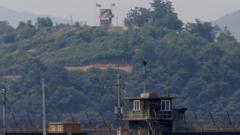South Korea's Joint Chiefs of Staff reported that the incident occurred when North Korean soldiers crossed the military demarcation line but quickly retreated. North Korean media responded harshly, warning that such provocations could lead to uncontrollable tensions. This flare-up comes as both nations grapple with their historical enmity, with efforts at improved relations under the new South Korean administration facing significant challenges, particularly following North Korea's dismissal of earlier conciliatory gestures. With the DMZ remaining a dangerous zone rife with potential for conflict, the region's stability is once more called into question.
As both nations assess their military readiness and diplomatic postures, the situation necessitates careful observation of this fragile relationship, characterized by intricate dynamics that could lead to further escalation or a renewed commitment to peace talks in the future.
The divide between the Koreas persists, shaped by decades of conflict, rhetoric, and traditional animosities, leaving the fate of regional peace uncertain as leaders navigate a complex web of national interests and historical grievances.
As both nations assess their military readiness and diplomatic postures, the situation necessitates careful observation of this fragile relationship, characterized by intricate dynamics that could lead to further escalation or a renewed commitment to peace talks in the future.
The divide between the Koreas persists, shaped by decades of conflict, rhetoric, and traditional animosities, leaving the fate of regional peace uncertain as leaders navigate a complex web of national interests and historical grievances.





















